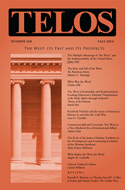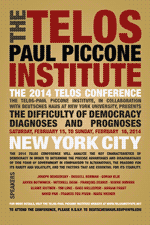By Mark W. Roche · Wednesday, September 27, 2017 American academics have much to lament about President Trump: his break with civility, his vilification of Mexicans and Muslims, his indifference to truth and to conflicts of interest, his hostility to science, his devaluation of diplomacy. Directly on campuses we recognize the vulnerability of undocumented students and dwindling numbers of international students. As a result, many faculty members and administrators have responded harshly to his presidency.
Yet President Trump retains the enthusiastic support of his base. This support stems to some degree from his courage, which contrasts so prominently with normal party politicians. Trump is a fighter who speaks his mind without constraint, mocking political correctness, challenging the Washington establishment, threatening North Korea, and pulling no punches even against allies. Trump himself has elevated this virtue. His campaign posters announced: “It’s easy to stand with the crowd; it takes courage to stand alone!”
But Trump is the opposite of courageous if one has any meaningful concept of this intellectual virtue.
Continue reading →
By Mary Frances McKenna · Thursday, October 30, 2014  In this article, I focus on the impact on modern Western thinking, ideas, and engagement with the world of the loss of the assumption of a creator, or an intelligent ordering agent, in conjunction with the emphasis on detail in preference to the whole in modern thought. I begin by discussing some of the critical dynamics contributed by Jerusalem, Athens, and Rome to the concept of Europe in an attempt to identify the source of the energy and vitality arising from this synthesis. I particularly look at the synthesis of Jerusalem and Athens, specifically how each influenced the other and where the potential for synergy arose. This Western synthesis no longer operates in Europe and the West. In this article, I focus on the impact on modern Western thinking, ideas, and engagement with the world of the loss of the assumption of a creator, or an intelligent ordering agent, in conjunction with the emphasis on detail in preference to the whole in modern thought. I begin by discussing some of the critical dynamics contributed by Jerusalem, Athens, and Rome to the concept of Europe in an attempt to identify the source of the energy and vitality arising from this synthesis. I particularly look at the synthesis of Jerusalem and Athens, specifically how each influenced the other and where the potential for synergy arose. This Western synthesis no longer operates in Europe and the West.
Continue reading →
By James King · Friday, April 18, 2014 The following paper was presented at the Eighth Annual Telos Conference, held on February 15–16, 2014, in New York City.
 In the perspective of many, the prime criticism of liberal theories of democratic politics is that such theories proceed with a certain false and idealized individual in mind—these are great theories, elegant or hubristic, but at bottom, theories and not “real politics.” Political liberalism wrongly imagines the citizen to be a rational individual, sure of his will and life plans—or is this imagining wrong? The deeper critique holds that liberalism describes a peculiar individual, and that this individual really exists, but looks strangely like the liberal theorist and his class. Thus, for example, John Rawls’s theory of justice is suggested to fail women and the profoundly disabled. My critique today follows in this vein; I wish to add to this characterization of liberalism’s presumed political actor by showing him to be antiheroic. In the perspective of many, the prime criticism of liberal theories of democratic politics is that such theories proceed with a certain false and idealized individual in mind—these are great theories, elegant or hubristic, but at bottom, theories and not “real politics.” Political liberalism wrongly imagines the citizen to be a rational individual, sure of his will and life plans—or is this imagining wrong? The deeper critique holds that liberalism describes a peculiar individual, and that this individual really exists, but looks strangely like the liberal theorist and his class. Thus, for example, John Rawls’s theory of justice is suggested to fail women and the profoundly disabled. My critique today follows in this vein; I wish to add to this characterization of liberalism’s presumed political actor by showing him to be antiheroic.
Continue reading →
|
|
 In this article, I focus on the impact on modern Western thinking, ideas, and engagement with the world of the loss of the assumption of a creator, or an intelligent ordering agent, in conjunction with the emphasis on detail in preference to the whole in modern thought. I begin by discussing some of the critical dynamics contributed by Jerusalem, Athens, and Rome to the concept of Europe in an attempt to identify the source of the energy and vitality arising from this synthesis. I particularly look at the synthesis of Jerusalem and Athens, specifically how each influenced the other and where the potential for synergy arose. This Western synthesis no longer operates in Europe and the West.
In this article, I focus on the impact on modern Western thinking, ideas, and engagement with the world of the loss of the assumption of a creator, or an intelligent ordering agent, in conjunction with the emphasis on detail in preference to the whole in modern thought. I begin by discussing some of the critical dynamics contributed by Jerusalem, Athens, and Rome to the concept of Europe in an attempt to identify the source of the energy and vitality arising from this synthesis. I particularly look at the synthesis of Jerusalem and Athens, specifically how each influenced the other and where the potential for synergy arose. This Western synthesis no longer operates in Europe and the West.  In the perspective of many, the prime criticism of liberal theories of democratic politics is that such theories proceed with a certain false and idealized individual in mind—these are great theories, elegant or hubristic, but at bottom, theories and not “real politics.” Political liberalism wrongly imagines the citizen to be a rational individual, sure of his will and life plans—or is this imagining wrong? The deeper critique holds that liberalism describes a peculiar individual, and that this individual really exists, but looks strangely like the liberal theorist and his class. Thus, for example, John Rawls’s theory of justice is suggested to fail women and the profoundly disabled. My critique today follows in this vein; I wish to add to this characterization of liberalism’s presumed political actor by showing him to be antiheroic.
In the perspective of many, the prime criticism of liberal theories of democratic politics is that such theories proceed with a certain false and idealized individual in mind—these are great theories, elegant or hubristic, but at bottom, theories and not “real politics.” Political liberalism wrongly imagines the citizen to be a rational individual, sure of his will and life plans—or is this imagining wrong? The deeper critique holds that liberalism describes a peculiar individual, and that this individual really exists, but looks strangely like the liberal theorist and his class. Thus, for example, John Rawls’s theory of justice is suggested to fail women and the profoundly disabled. My critique today follows in this vein; I wish to add to this characterization of liberalism’s presumed political actor by showing him to be antiheroic. 

